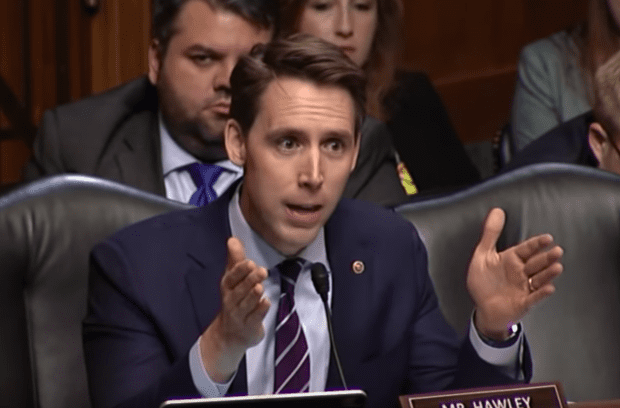Hawley’s Puzzling Foreign Policy Speech

Curt Mills reports on Sen. Josh Hawley’s foreign policy speech from earlier today:
Still, those who wish for U.S. foreign policy recalibration found elements of his address in need of more clarification—for instance, why the standard-line, Republican focus on Iran, a middleweight power in a middleweight region? “Senator Hawley said all the right things about the bankrupt foreign policy consensus in Washington,” said Gil Barndollar of the Center for the Study of Statesmanship. “But talk is cheap. It’s not clear yet whether he will confront his party or the president on issues of war and peace.”
Hawley made a few interesting points in his speech, but the senator also said a number of puzzling and disturbing things that deserve some additional comment. On the plus side, Hawley referred to America’s “metastasizing commitments” overseas, which suggests that he may see our growing number of foreign entanglements as a sort of cancer to be rooted out. As a general statement, this sounds promising, but it would be helpful to know how many of these commitments the senator thinks the U.S. should do away with. In the opening section of his speech, he questions the wisdom of what he calls the consensus in favor of “progressive universalism,” and suggests that it is in need of replacement. The description of the international order that he favors sounds reasonable enough:
We seek an international system that is free from hegemonic rule, free from suzerainty or control by any one state. We seek an international system where nations can make their own choices, where they can meet on a level field, where they can control their own destinies.
That would seem to imply a shift away from U.S. primacy, but it isn’t clear that this is what Hawley means by this. A system free from hegemonic rule would mean that the U.S. forsakes hegemony and settles for a less domineering role. The second part of the speech doesn’t support that interpretation of Hawley’s vision. Hawley uses the rhetoric of anti-imperialism, too:
Imperial domination violates our principles and it threatens our character. Our aim must be to prevent imperialism, not exercise it; to stop domination, not foster it.
The rejection of practicing imperialism sounds promising, but it could just as easily be turned into a Wilsonian call to arms in the name of “preventing” someone else’s imperialism, real or imagined. This is where Hawley’s hawkish line on China becomes quite worrisome:
For this is more than a contest between economic competitors, much more than a rivalry. This is a bid for mastery by an authoritarian and imperial state that we fundamentally cannot trust and that we fundamentally cannot ignore.
Like many other China hawks, Hawley overstates both Chinese ambitions and capabilities. While he criticizes “metastasizing commitments” elsewhere, his objection to them is that they are a distraction from the great power rivalry that he thinks the U.S. should be focused on. In other words, he would trade our excessive commitments in other parts of the world for a very dangerous contest with a nuclear-armed major power that would entail even greater commitments than we currently have.
Then there is a puzzling comment that he makes in connection with Hong Kong:
Let me be clear, our task is not to remake China from within. Rather, it is to deny Beijing’s ability to impose its will without, whether it be upon Hong Kong, or Taiwan, or our allies and partners–or upon us.
This conflates and muddles things in a dangerous way. Hong Kong is both de facto and de jure a part of China. When Beijing imposes its will on Hong Kong, that is quite different from anything it may try to do against its neighbors. The U.S. cannot deny Beijing’s ability to impose its will inside its own territory, and any attempt to do so would be calamitous. Hawley seems to be letting his sympathy for Hong Kong override his better judgment on this point. Despite his objections to “metastasizing commitments” in other places, the senator seems to be inventing new commitments in Asia that the U.S. has never had before and cannot possibly fulfill.
We know from Hawley’s voting record so far that he has not been willing to break with the party leadership and the White House on matters of war as they relate to Yemen and Saudi Arabia. Sen. Hawley voted against the Senate’s resolution of disapproval that opposed the president’s effort to circumvent Congress with a bogus “emergency” to expedite arms sales to Saudi Arabia and the UAE. More important, he voted with the president and most Senate Republicans against the antiwar Yemen resolution that would have cut off all U.S. support to the Saudi coalition. As Mills has reported previously, Hawley takes his foreign policy cues from Arkansas Sen. Tom Cotton, whom he regards as his “guiding light” on the subject, so we shouldn’t be surprised that he ends up sounding like his hard-line mentor when it counts.